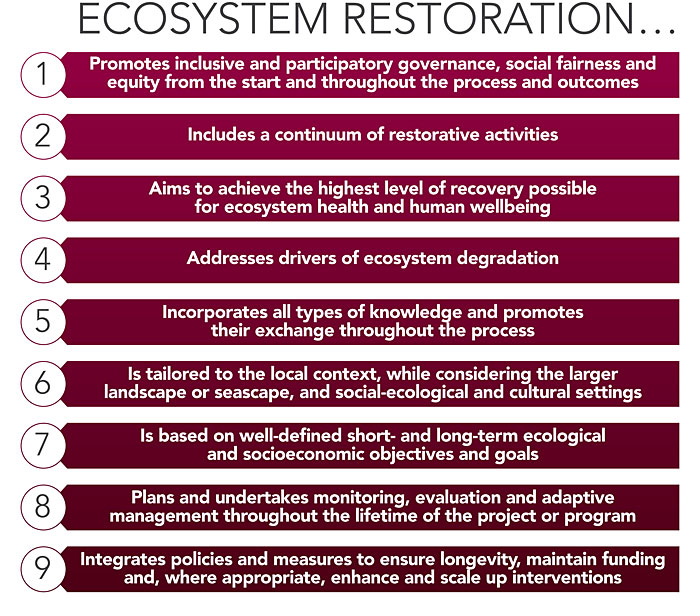Montana Leads Efforts to Define UN Ecosystem Restoration Principles
 MISSOULA – University of Montana Professor Cara Nelson is leading an international effort to define guiding principles for a new United Nations initiative that aims to reverse the degradation of global ecosystems.
MISSOULA – University of Montana Professor Cara Nelson is leading an international effort to define guiding principles for a new United Nations initiative that aims to reverse the degradation of global ecosystems.
The UN launched its Decade on Ecosystem Restoration initiative June 4 with nine guiding principles for ecosystem restoration.
“The launch of the Decade on Ecosystem Restoration is an unparalleled opportunity to advance ecosystem repair and improve human well-being,” said Nelson, a professor of restoration ecology in UM’s W.A. Franke College of Forestry and Conservation. “These nine principles are intended to provide the global restoration community with clear guidelines for the design, implementation and monitoring of activities done under the Decade, so that these activities result in the highest possible level of net improvement for nature and people.”
The principles were developed as a collaborative effort by the International Union for Conservation of Nature’s Commission on Ecosystem Management (CEM), the Society for Ecological Restoration and the Best Practices Task Force of the UN Decade on Ecosystem Restoration.
Other members of the leadership team include Jim Hallett, an affiliate professor in UM’s Department of Ecosystem and Conservation Sciences and chair of the Society of Ecological Restoration, and Bethanie Walder, the executive director of the society and a master’s degree alumna of UM’s Environmental Studies Program.
Ecosystem degradation and destruction are major environmental issues, said Nelson, who leads the IUCN CEM’s Ecosystem Restoration Thematic Group and is a member of the UN Decade’s Best Practices Task Force.
“Ecological restoration – assisting in the recovery of ecosystems that have been degraded or destroyed – is a key solution to these challenges, but repairing degraded ecosystems is complex,” she said. “Unless there is clear and adequate guidance on science, practice and policy, there’s risk that management activities intended to be restorative might not provide their intended benefits and instead could result in further degradation or inequitable social benefits.”
“There is no longer a question of whether restoration is needed,” said Christophe Besacier, a forestry officer with the UN’s Food and Agriculture Organization. “It’s clear we cannot address the climate emergency without it. But this is the first time we have had common principles to ensure restoration is implemented in a manner that enhances both human and ecological conditions. This collaboration is a really important step forward for ecosystem restoration.”
In order to advance the scientific underpinning of ecosystem restoration, SER and IUCN CEM engaged 58 restoration experts from 23 countries and 42 organizations during the third Biennial Global Forum on Ecological Restoration in April.
These experts delivered initial recommendations for principles for ecosystem restoration. Nelson and Hallett, along with Andrea Romero Montoya, a consultant with the FAO’s Forest and Landscape Restoration Mechanism, Forestry Division, then led a seven-member team to refine the principles based on input received from UN Decade and Global Forum participants.
“To fulfill the ambitions of the UN Decade, the next 10 years must see a massive acceleration in the pace of global restoration activity,” Hallett said. “That’s why it is so important to have strong principles, sound science, engaged communities and a common understanding of the wide array of restorative activities that can heal the planet.”
Angela Andrade, chair of the IUCN Commission on Ecosystem Management, added: “The products of the Global Forum provide critical tools for practitioners, policymakers and investors to effectively design, implement and measure success in restoration across all ecosystems and scales. We are very excited about what this means for the UN Decade and ensuring that projects around the world are delivering a net gain for ecosystems, for biodiversity and for local communities.”
The principles were released this month during UN Decade Launch events. The principles are open for public consultation in June and July and will be finalized at the IUCN World Conservation Congress in September. Held once every four years, that event brings together several thousand leaders and decision-makers from government, civil society, indigenous peoples, business and academia with the goal of conserving the environment and harnessing the solutions nature offers to global challenges.
“Ecosystem restoration projects and programs in Montana face the same challenges as those in the rest of the world,” Nelson said. “The principles of ecosystem restoration were designed to apply to all ecological and social contexts – from grasslands of Montana to tropical marine biomes – and should help local restoration stakeholders across the globe navigate trade-offs between conservation of biological diversity and the ability of ecosystems to deliver goods and services for human well-being.”
The guiding principles follow. Ecosystem restoration:
- Promotes inclusive and participatory governance, social fairness and equity from the start and throughout the process and outcomes.
- Includes a continuum of restorative activities.
- Aims to achieve the highest level of recovery possible for ecosystem health and human well-being.
- Addresses drivers of ecosystem degradation.
- Incorporates all types of knowledge and promotes their exchange throughout the process.
- Is tailored to the local context, while considering the larger landscape or seascape, and social-ecological and culture settings.
- Is based on well-defined, short- and long-term ecological and socioeconomic objectives and goals.
- Plans and undertakes monitoring, evaluation and adaptive management throughout the lifetime of the project or program.
- Integrates policies and measures to ensure longevity, maintain funding and, where appropriate, enhance and scale up interventions.
###
Contact: Cara Nelson, UM professor of restoration ecology, cara.nelson@umontana.edu; Jim Hallett, chair of the Society for Ecological Restoration and UM faculty affiliate, james.Hallett@umontana.edu.